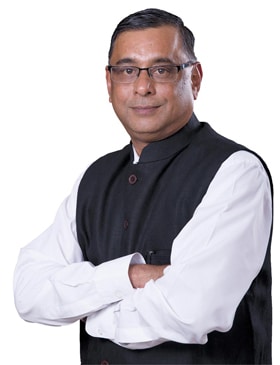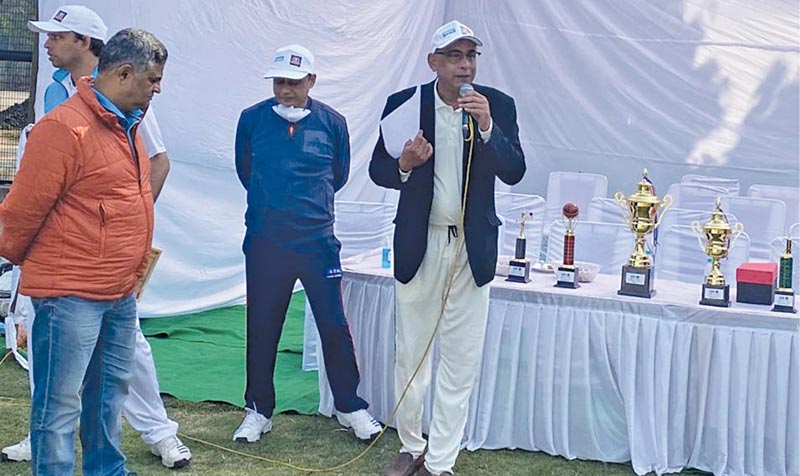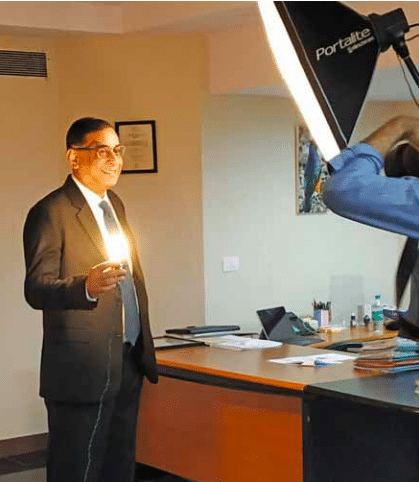It takes a lot of guts to seek a warrant to conduct income tax raid on a person who is the 150th most wealthy person in the world, and the guts need to be super strong when you know that this person has very influential connections in the political circles of India. Saurabh Kumar, Executive Vice Chairperson, Energy Efficiency Services Limited (EESL) Group, during his tenure as an Indian Revenue Services officer, did not think twice before seeking such a warrant, and despite a lot of influential people warning him against doing so, he went ahead and conducted the raid.
Later, he went on to draw on paper what EESL would look like. Despite being one of the brains behind EESL, he decided not to take a position in the same as CEO, as some would call it a selfish move. Today, he is making sure that EESL delivers on saving the environment, and at the same is helping entrepreneurs in their business. This is Saurabh Kumar’s story!

Born and brought up in Prayagraj (known as Allahabad back then), Kumar belongs to a middle-class family. Good in academics, Kumar learned the true meaning of hard work and honesty from his grandfather, who was a government servant. There was no business element in Kumar’s family.
“There is no legacy you can hang on to, no wealth you can turn back to, to be successful and give your life its true meaning. The only choice is to work hard. The basic thing and requirement is to be honest with yourself. There is no substitute for hard work, and if you do not do hard work, life will become very hard for you,” says Kumar, recalling the advice he received from his grandfather and father.
Kumar learnt the above-mentioned fact of life at a very young age. Most of the learnings like this came to him through his grandfather. He is proud of the fact that his grandfather was respected by one and all, not because he was a government servant but because he was honest and listened to problems people faced on professional as well as personal level. His grandfather was posted as deputy commissioner with the India Customs department before retiring from the job. As is well known, this designation gives a lot of power to an individual.

“A lot of government servants forget that people respect them because they are sitting in an important chair. People mostly respect the chair and not the individual. An individual earns respect beyond that chair by proving his professional worth and through good behaviour. My grandfather was one such individual, who earned respect by excelling at what he did,” says Kumar, who is now the vice chairperson of EESL.
He adds, “The chair I am sitting on today is not permanent for me, but if I am able to earn respect from people through professional competence, that will last forever.”
Kumar never had the opportunity to visit his grandfather’s office with him. However, he does remember officials from the government visiting his house, after his grandfather retired, to seek suggestions and advice about work. Kumar was around ten years old when his grandfather retired. The things that he recalls from those days include his grandfather’s official car not showing up any more on the door, but other government officials’ cars coming and leaving their house every day. These were the people who came looking for advice from his grandfather and he never said no to anyone when it came to personal or professional help.
“My grandfather was one of the most competent officers back in the 1970’s. To top it all, he was honest, and I think being competent and being honest at the same time is a rare trait in people,” he says with pride about his grandfather.
Never wanted to be a government servant
Despite most of Kumar’s family working in the government, he never thought of being in the government service. After finishing his schooling, he passed several entrance exams and got admitted to the Indian Institute of Technology (IIT), Kanpur. And, while he does not say so, probably his love for energy-efficient devices started there while he was pursuing Electrical and Electronics Engineering.
“To be very honest, landing a government job was never on my To Do list. Actually, I did not want to be in the government at all. I graduated in 1989 and was all set to go abroad for work,” recalls Kumar.
Amazingly, around fifty of his batchmates from IIT Kanpur are working outside India and are getting paid handsomely well. And the person who did not want to be in the government gave five competitive exams for government jobs and cleared one of the toughest ones out there – the coveted Civil Services!
The inspiration to drop his dream of working abroad and giving the UPSC Civil Services exam came from his mother. He cleared the UPSC exam in his second attempt and got posted in the Indian Revenue Services (IRS) team. If you have heard of income tax raids, you must know it is the IRS officers that make them possible.
“I was all set to leave India when my late mother inspired me to try my hands at the civil services examination. Initial plan was to try the exams at least once. People who have appeared in the exams know the rigors associated with the exams. Today, when I look back at those days, I have no regrets. Instead I am all thanks to my mother who inspired me to take on the exams,” shares Kumar laughingly.
Kumar at that time had enrolled as a research associate with IIT Kanpur but was seeking to head outside India. He is quite sure that if not UPSC, he would have been working outside India in a technical role. If at all Kumar was to change anything from his early days, he would like to stop being an introvert
R.K. Laxman, Amitabh Bachchan, and Cricket
The first time Kumar got any access to a television set was when he was seventeen years of age. His family did not own a TV before that. Kumar recalls that he used to wait for the newspaper every day to see the cartoons made by R.K. Laxman. Though he was also fond of other cartoon series like Asterix, R.K. Laxman continues to remain his favourite. Kumar stopped watching movies in 1990 after he stopped liking the work of his favourite actor Amitabh Bachchan.
“I was seventeen when we got our first TV, so there was no chance of watching cartoons or anything else on TV before that. Then I got admitted to IIT Kanpur and was never able to find time for watching anything on TV. But I was into a lot of reading,” says Kumar.
Kumar, in fact, is into lot of reading since his childhood. He was a fond reader of the work by Alistair Mclean and Sydney Sheldon till his ninth standard in school. He, however, started giving more time to preparation for entrance exams for IIT after the tenth standard. Allahabad, as a city, was not particularly known for any kind of entrance exam coaching back in the 1980s, and most of the preparation that Kumar did was through school and on his own.
“The eleventh and twelfth standards were only about studies and nothing else. The only recreational activity that I did in these classes was playing cricket,” says Kumar. His favourite cricketers till date happen to be England’s David Gower and India’s Sunil Gavaskar.

He recalls that the syllabus at IIT did not leave any room to take up reading any other kind of books. But once he started pursuing his masters in Japan, he was able to find more time for reading. What caught his attention in books and content? Well, anything and everything around environment and its sustainability!
Jared Diamond’s work in the book titled ‘Collapse: How Societies Choose to Fail or Succeed’ has moved him a lot and allowed him to see what happens in the world with a new perspective. This book is known for its coverage of economic and environmental disasters.
“Jared Diamond in this book talks about the Amazon Forest. A phrase that he uses in the book is Landscape Amnesia. He explains how a part of the forest goes on to be completely degraded in just ten years of time, damaged in a way that it has almost become impossible to replenish it. Such things leading to collapse is all that book is about,” Kumar explains about the book.
The greatest lesson that this book taught him is that rather than looking at everyday things, we as humans should pay close attention to what should be preserved and when it should be preserved. The book tells great tales of why civilisations fail due to landscape amnesia. This is where I could connect the dots between him trying super hard to make EESL a hit in India and beyond. Kumar seems greatly concerned about saving energy because it, in turn, saves the environment.








